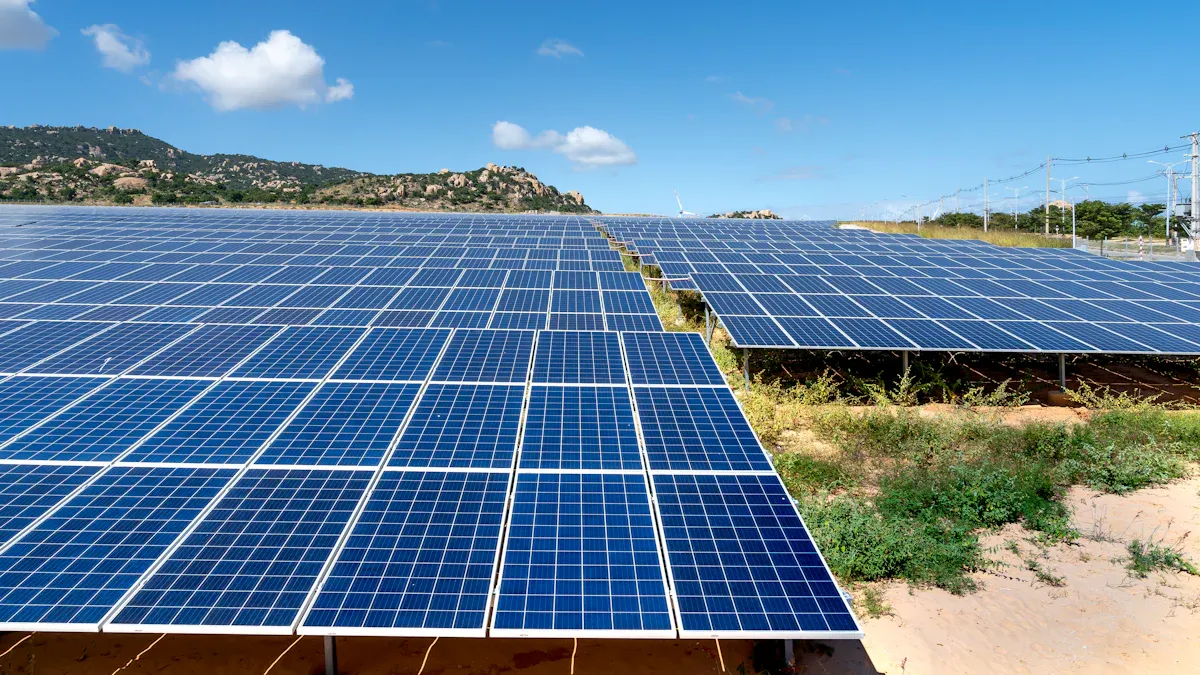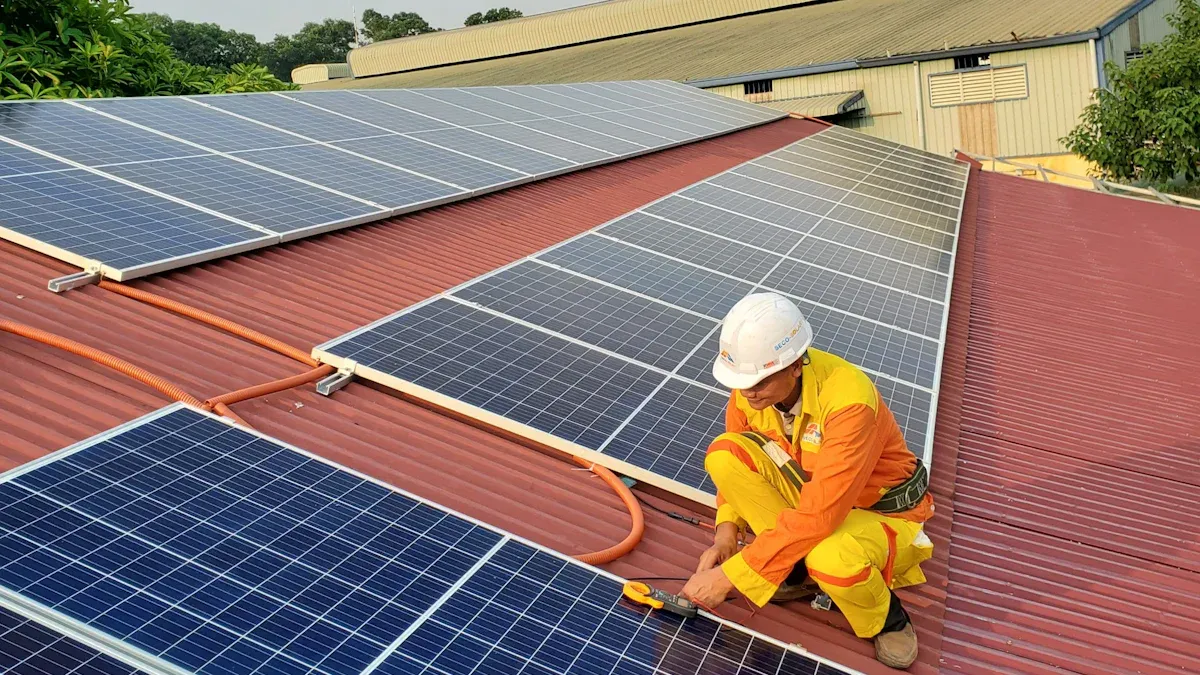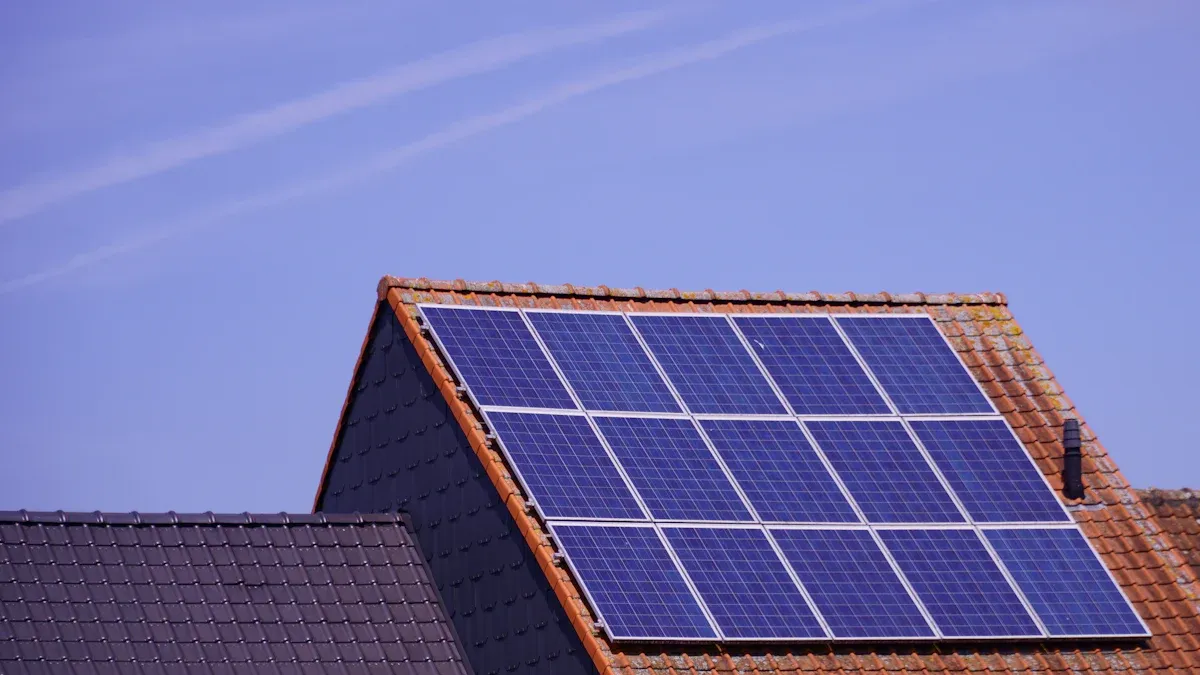
Choosing the right solar panel is more important than ever in 2025. You want a system that lasts, performs well, and saves you money over time. A reliable panel doesn’t just power your home—it gives you energy independence and peace of mind. Why settle for less when sustainability is within reach?
Key Takeaways
- Pick solar panels that match your needs, like efficiency, strength, and cost. SunPower and Maxeon work very well, while REC and Canadian Solar are affordable options.
- Check warranties and support before buying solar panels. Get a warranty of 20 years or more to keep your money safe and ensure they last long.
- Think about how they are installed and cared for. Expert installation helps them work better, and cleaning them often keeps them running well.
Top Solar Panel Brands in 2025

Overview of Leading Solar Panel Brands
When it comes to solar panels, not all brands are created equal. Some stand out because of their innovation, durability, and customer satisfaction. In 2025, a few names dominate the market, and for good reason. These brands have consistently delivered high-quality products that meet the needs of homeowners and businesses alike.
You’ve probably heard of SunPower, Maxeon, REC, Panasonic, and Canadian Solar. These companies have earned their reputation by offering reliable solar panels that perform well in different conditions. Whether you’re looking for maximum efficiency, long-term durability, or great value for money, these brands have something to offer.
Each of these companies brings unique strengths to the table. Some focus on cutting-edge technology, while others prioritize affordability without compromising quality. By understanding what makes these brands special, you can make an informed decision about which one suits your needs best.
Key Strengths of SunPower, Maxeon, REC, Panasonic, and Canadian Solar
Let’s take a closer look at what sets these brands apart:
-
SunPower: Known for its high-efficiency solar panels, SunPower is a favorite among homeowners who want top-tier performance. Their panels are designed to produce more energy over time, even in low-light conditions. If you’re aiming for maximum output, SunPower won’t disappoint.
-
Maxeon: As a spin-off from SunPower, Maxeon focuses on durability and innovation. Their panels are built to last, with a design that resists cracking and corrosion. This makes them a great choice if you live in areas with extreme weather.
-
REC: REC combines efficiency with affordability. Their panels offer solid performance at a price that won’t break the bank. Plus, they’re known for their eco-friendly manufacturing processes, which is a bonus if sustainability is a priority for you.
-
Panasonic: Panasonic has a long history of producing reliable solar panels. Their HIT® technology ensures high efficiency, even in hot climates. If you’re in a sunny region, Panasonic panels can help you make the most of your solar investment.
-
Canadian Solar: This brand is all about value for money. Canadian Solar offers a wide range of panels that balance performance and cost. They’re a popular choice for budget-conscious buyers who still want a dependable solar panel system.
Each of these brands excels in different areas, so the best choice depends on your specific needs. Whether you prioritize efficiency, durability, or affordability, one of these companies is sure to have the perfect solution for you.
Comparison of Solar Panel Brands
Reliability and Durability
When you're investing in a solar panel system, reliability and durability are two of the most important factors to consider. After all, you want panels that can withstand the test of time and keep generating energy for years to come. Some brands, like Maxeon and SunPower, are known for their exceptional durability. Their panels are built with high-quality materials that resist cracking, corrosion, and wear, even in harsh weather conditions.
If you live in an area with extreme temperatures or frequent storms, you’ll want to prioritize brands that offer robust designs. For example, Maxeon panels feature a solid copper foundation, which makes them less likely to degrade over time. On the other hand, REC panels are designed with reinforced frames, making them a great choice for regions with heavy snow or wind.
Durability isn’t just about surviving tough weather. It’s also about maintaining performance over the years. A reliable solar panel should lose only a small percentage of its efficiency annually. Brands like SunPower and Panasonic excel in this area, offering some of the lowest degradation rates in the industry.
Efficiency Ratings of Top Brands
Efficiency is all about how much sunlight your solar panel can convert into usable energy. The higher the efficiency, the more power you’ll get from the same amount of sunlight. This is especially important if you have limited roof space or want to maximize your energy output.
SunPower leads the pack with efficiency ratings that often exceed 22%. Their panels are designed to capture more sunlight, even in low-light conditions. Panasonic isn’t far behind, with their HIT® technology delivering impressive efficiency, particularly in hot climates.
REC and Canadian Solar offer solid efficiency ratings as well, typically ranging from 19% to 21%. While they may not match SunPower’s top-tier performance, they still provide excellent value for their price. If you’re looking for a balance between efficiency and affordability, these brands are worth considering.
Warranty and Customer Support
A good warranty can give you peace of mind, knowing that your investment is protected. Most top solar panel brands offer warranties that cover both product defects and performance. SunPower and Maxeon stand out here, offering 25-year warranties that cover both the panels and their performance.
Panasonic also provides a strong warranty, often covering their panels for up to 25 years. REC and Canadian Solar typically offer warranties ranging from 20 to 25 years, which is still above the industry average.
Customer support is another key factor. You want a company that’s easy to reach and quick to resolve any issues. SunPower and Panasonic are known for their excellent customer service, while REC and Canadian Solar also receive positive reviews in this area.
Cost and Value for Money
Cost is often the deciding factor when choosing a solar panel. While high-efficiency panels like SunPower and Panasonic come with a premium price tag, they offer long-term savings through higher energy output and lower degradation rates.
If you’re on a budget, brands like REC and Canadian Solar provide great value for money. They may not have the highest efficiency ratings, but they still deliver reliable performance at a more affordable price.
Think about your long-term goals. Are you looking for the best performance, or do you want a cost-effective solution? By weighing the upfront cost against the potential savings, you can find a solar panel that fits your needs and budget.
In-Depth Reviews of Each Brand
SunPower: Features, Pros, and Cons
SunPower is a name you’ve probably heard if you’ve been researching solar panels. Their panels are famous for their high efficiency, often exceeding 22%. This means you get more energy from the same amount of sunlight. SunPower panels also have a sleek design, which can enhance your roof’s appearance.
Pros:
- Industry-leading efficiency.
- Low degradation rates, ensuring long-term performance.
- Backed by a 25-year warranty.
Cons:
- Higher upfront cost compared to other brands.
If you want the best performance and don’t mind paying a premium, SunPower is a solid choice.
Maxeon: Features, Pros, and Cons
Maxeon, a spin-off from SunPower, focuses on durability and innovation. Their panels are built with a solid copper foundation, making them resistant to cracking and corrosion. This durability makes Maxeon panels ideal for areas with extreme weather.
Pros:
- Exceptional durability and weather resistance.
- High efficiency, close to SunPower’s levels.
- 25-year comprehensive warranty.
Cons:
- Premium pricing, similar to SunPower.
Maxeon is perfect if you live in a challenging climate and need a solar panel that lasts.
REC: Features, Pros, and Cons
REC strikes a balance between performance and affordability. Their panels offer solid efficiency, typically around 20%, and are known for their eco-friendly manufacturing. REC also designs panels with reinforced frames, making them a good option for snowy or windy regions.
Pros:
- Affordable without sacrificing quality.
- Environmentally friendly production.
- Reliable performance in harsh conditions.
Cons:
- Slightly lower efficiency compared to premium brands.
If you’re looking for value and sustainability, REC is worth considering.
Panasonic: Features, Pros, and Cons
Panasonic has been a trusted name in the solar industry for years. Their HIT® technology ensures high efficiency, even in hot climates where other panels might struggle. Panasonic panels also come with a strong warranty, giving you peace of mind.
Pros:
- Excellent performance in high temperatures.
- Long-lasting with low degradation rates.
- 25-year warranty for added security.
Cons:
- Limited availability in some regions.
Panasonic is a great choice if you live in a sunny area and want reliable performance.
Canadian Solar: Features, Pros, and Cons
Canadian Solar is all about delivering value. Their panels are affordable and offer decent efficiency, usually between 19% and 21%. While they may not match the performance of premium brands, they’re a dependable option for budget-conscious buyers.
Pros:
- Cost-effective without compromising reliability.
- Wide range of panel options to suit different needs.
- Positive customer reviews for support and service.
Cons:
- Slightly higher degradation rates over time.
If you’re on a budget but still want a dependable solar panel, Canadian Solar is a smart pick.
How to Choose the Most Reliable Solar Panels
Evaluating Your Energy Needs
Start by figuring out how much energy your household uses. Look at your electricity bills to see your average monthly consumption. Do you plan to power your entire home or just specific appliances? Knowing this helps you decide how many panels you’ll need. If you’re aiming for complete energy independence, you might want a system that generates a bit more than your current usage. This way, you’ll have extra energy for future needs or cloudy days.
Understanding Panel Types and Technologies
Not all solar panels are the same. You’ll come across three main types: monocrystalline, polycrystalline, and thin-film. Monocrystalline panels are the most efficient and durable, making them a great choice if you have limited roof space. Polycrystalline panels are slightly less efficient but more affordable. Thin-film panels are lightweight and flexible, but they don’t last as long. Think about your priorities—efficiency, cost, or flexibility—and choose the type that fits your situation best.
Assessing Warranties and Certifications
A good warranty is like a safety net for your investment. Look for panels with at least a 20-year performance warranty. This ensures the panel will still produce a significant percentage of its original output after two decades. Certifications also matter. They show that the panels meet industry standards for quality and safety. For example, certifications like IEC 61215 or UL 1703 indicate the panel has been tested for durability and performance.
Considering Installation Quality and Maintenance
Even the best solar panel won’t perform well if it’s installed poorly. Make sure you hire a certified installer with a good track record. Ask for references or read reviews to ensure they know what they’re doing. After installation, regular maintenance is key. Clean the panels occasionally to remove dirt and debris, and check for any signs of wear. A little upkeep goes a long way in keeping your system running efficiently.
Factors Affecting Solar Panel Reliability

Panel Type and Material Quality
The type of solar panel you choose plays a big role in how reliable it is. Monocrystalline panels are the most durable and efficient. They’re made from a single crystal structure, which helps them last longer and perform better. Polycrystalline panels, while slightly less efficient, are still a solid choice if you’re looking for something more affordable. Thin-film panels, on the other hand, are lightweight and flexible but tend to degrade faster.
Material quality also matters. High-quality materials resist wear and tear better. For example, panels with tempered glass and corrosion-resistant frames can handle tough conditions. When you’re shopping for a solar panel, check the specs to see what materials were used. Better materials mean fewer problems down the road.
Impact of Weather and Environmental Conditions
Your local weather can affect how well your solar panels perform. If you live in a sunny area, you’ll get more energy output. But extreme weather, like heavy snow, hail, or high winds, can damage panels over time. Panels designed for harsh conditions, like those with reinforced frames, are a smart choice if you face tough weather.
Dust, dirt, and even bird droppings can also reduce efficiency. Regular cleaning helps keep your panels working at their best. If you live near the coast, salt in the air can cause corrosion. In that case, look for panels specifically made to resist salt damage.
Importance of Professional Installation
Even the best solar panel won’t perform well if it’s installed poorly. A professional installer knows how to position the panels for maximum sunlight. They’ll also secure them properly to prevent damage from wind or other elements. Poor installation can lead to loose connections or even system failure.
Hiring a certified installer ensures your system meets safety standards. It also gives you peace of mind knowing the job was done right. Don’t forget to ask about maintenance tips during the installation process. A little care goes a long way in keeping your system reliable.
Choosing the right solar panel brand can make all the difference. Brands like SunPower, Maxeon, and REC offer reliability, efficiency, and value.
📝 Tip: Focus on your energy needs, warranties, and installation quality when deciding.
Investing in high-quality panels ensures long-term savings and a greener future. Why wait? Start your solar journey today! 🌞
FAQ
What is the lifespan of a solar panel?
Most solar panels last 25–30 years. With proper maintenance, they can continue producing energy beyond that, though efficiency may decrease slightly.
Do solar panels work during cloudy days?
Yes, they do! Solar panels still generate energy on cloudy days, but the output is lower compared to sunny conditions. Efficiency depends on the panel type.
How often should you clean your solar panels?
Clean your panels every 6–12 months. Dust, dirt, and debris can reduce efficiency. Use water and a soft brush for best results.
📝 Tip: Check your panels after storms or heavy winds for debris or damage.